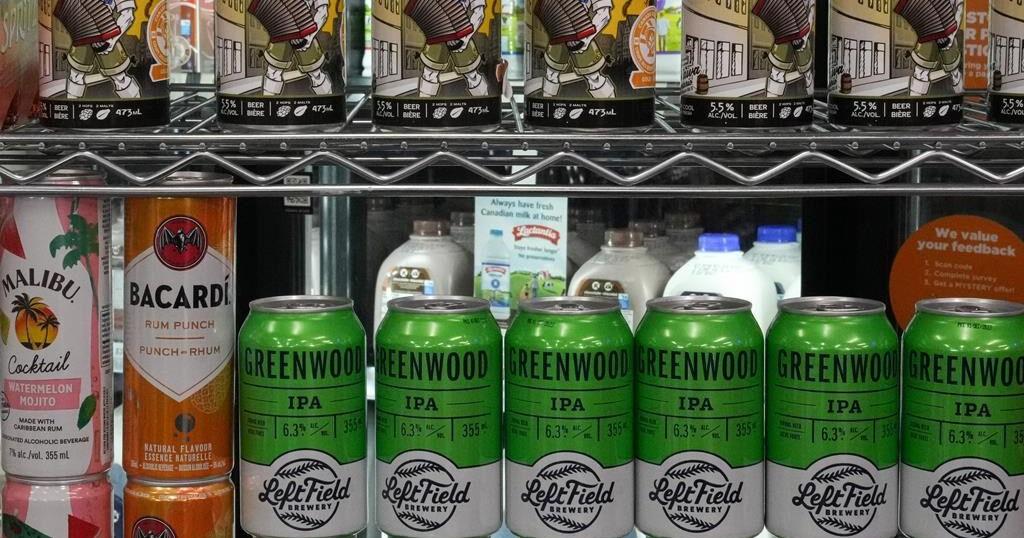Convenience stores across Ontario are allowed to sell booze as of Thursday as the province significantly loosens its grip on the alcohol marketplace.
Corner stores are excited about the change and expect foot traffic to increase significantly, said Kenny Shim, the president of the Ontario Convenience Store Association, which represents about 7,000 of 10,000 such stores across the province.
“I have to admit, I’m excited, we’re all excited because sales are down because of the bad economy,” Shim said.
The Alcohol and Gaming Commission of Ontario said that by Tuesday it had granted 4,200 licences to convenience stores. That means roughly 40 per cent of convenience stores will be able to sell beer, wine, cider and ready-to-drink cocktails.
All grocery stores will be able to sell alcohol by Oct. 31, but spirits will only be available in Liquor Control Board of Ontario stores and outlets.
Shim said the development for convenience stores is a lifeline to many stores that have seen tobacco sales plummet, which he attributes to the rise of illegal tobacco sales and a slumping economy.
“When people come to buy a beer, they’ll buy some peanuts, maybe some cups for beer pong, some beef jerky, bottle openers, that kind of stuff,” he said.
The stores will be allowed to sell alcohol from 7 a.m. to 11 p.m., and 20 per cent of beer, cider and premixed cocktails on display must be from small Ontario producers, while 10 per cent of wine on display must be devoted to small Ontario wineries.
Convenience stores must remain vigilant about following the rules, Shim said, because the penalties for breaking the law, like selling to minors or to those who are intoxicated, are severe. They range from fines, upward to $50,000, and the loss of the liquor licence.
“I really like it because I am a law-abiding citizen and we know that the province will be out with inspectors,” Shim said.
“I have children, too, and the last thing I want is to sell to a minor, plus the penalties are so severe that it’s not worth risking your entire business for a few bottles of beer.”
The changes fulfil a 2018 campaign pledge from Premier Doug Ford, who promised to bring beer and wine to corner stores.
A 10-year-deal with The Beer Store stood in the way of that promise until May, when Ford said he had broken the deal and brokered a new one with the company. The Beer Store, owned by three international conglomerates, will be paid $225 million taxpayer dollars under the new deal.
Part of the new agreement with the Beer Store includes keeping at least 386 stores open until July 2025 and at least 300 until Dec. 31, 2025. The Beer Store will continue with its widely respected recycling program until at least 2031.
“This is good for choice and it’s really good for a local jobs,” Finance Minister Peter Bethlenfalvy said in an interview. “So I’m feeling really good.”
The LCBO came to existence in 1927 as the province pulled out of Prohibition with tight controls on alcohol.
“This is a big, big reform, but one that the people really want and we’re delivering it,” Bethlenfalvy said.
Several health organizations, including Toronto’s Centre for Addiction and Mental Health, have expressed concern and disappointment with the move to expand alcohol sales.
They say the easier access to alcohol will increase dependence, cause chronic diseases, and increase injuries, suicides, and impaired driving.
Bethlenfalvy said the government has spoken to numerous health organizations about the change.
“We take it extremely seriously, social responsibility,” he said.
Increased access to alcohol corresponds to increased consumption and with that come more health risks, said Dr. Leslie Buckley, chief of the addictions division at the Centre for Addiction and Mental Health.
“This would be a great time, obviously, to invest in more treatment for alcohol,” she said.
“It’s not necessarily easy to get treatment early on or even at the stage of moderate difficulties with alcohol and it would be really great to be able to intervene earlier and give people access to treatment.”
The province has said it will spend $10 million to support social responsibility and public-health efforts related to the consumption of alcohol as part of its 10-year, $3.8 billion mental-health plan.
This report by The Canadian Press was first published Sept. 5, 2024.

























